23 People Disclosed How Much Debt They Carry And How They're Handling It, And I Love The Transparency
The average American carries over $90,000 in debt, according to data from the credit bureau Experian. However, because of money shame and secrecy around our finances, we so rarely talk about our debt. And this silence can leave us feeling totally alone and overwhelmed every time we open those dreaded monthly statements.
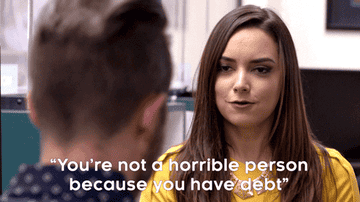
TruTV / Via giphy.com
From student loans and mortgages to credit cards and personal loans, debt is a tool that most of us will end up using at some point. So why don't we talk about it more?
Just as pay transparency can help us know our worth and fight for what we deserve, I think debt transparency can help us overcome these negative feelings and learn from one another. So I asked members of the BuzzFeed Community to share how much debt they have and how they're dealing with it. Here's what they had to say:
1."When I finished graduate school more than a decade ago, my student loan balance was $82,000. After all those years of payments totaling more than $60,000, I can now proudly say that my balance is...$76,000. It feels impossible. I focused on working for nonprofits so I could qualify for public service loan forgiveness, but because there are surprisingly many types of nonprofits — 501(c)(3), 501(c)(4), 501(c)(6), 501(c)(7), etc. — I recently discovered that one of my nonprofit employers was actually not eligible for that forgiveness. So instead of being within a year of forgiveness, I'm barely halfway."

"We moved to an area with a lower cost of living and try to be really strategic with our finances, but it is so frustrating to know that I've followed the rules and paid so much money toward those loans and have so little to show for it. I'd love to be saving for my children's futures, but unless I can somehow come up with a huge sum of money all at once to finally get out of the interest trap, I'll probably be dragging these loans around for years."
—Kelly, 34
2."Most of mine is medical debt — even though my kids and I have two insurance plans. Those hidden out-of-pocket minimum and maximum payments, coinsurance, and deductibles add up so fast. I'm disabled, which got my student loans removed, but yeah. I have two kids on the spectrum, my chronic illnesses, etc., and medical debt is for life. I'm handling it with the 'Lalalalala, I'm not listening' method at the moment. If and when my situation ever changes that I can chip away, I will, but for now? Handling it isn't in my budget."
3."Not including my car, I have around $20,000 in debt by way of credit cards. I’m supposed to be receiving a large life insurance payout from my dad’s passing, which was about a month ago (like $100,000-plus!). I definitely want to use some of it to wipe out some of that debt, if not all. Then I plan on saving/investing a large portion of it."
"Please pay it all off. You won’t get nearly the return on investing that you’re being charged in interest."
—MX
4."Currently, outside of my mortgage, due to a very expensive emergency vet visit, I'm sitting at $9,000 in credit card debt and an additional $14,000 in federal student loans. Luckily, it's on a newer 0% interest card, so I'm attacking it as much as I possibly can. The student loans...well, I'm hoping we get lucky with the Supreme Court. About seven years ago, I got myself into a very bad position debt-wise, with over $25,000 worth of credit cards and loans, just by poor choices on my part, including a predatory consolidation loan that didn't close my cards at the time. Things worked out, and between leaving a job and starting a new position making significantly more, I drew from my 401(k) to pay all of that off and have since made up that money in my 401(k). I swore at that point not to do that again; it's really stressful to be at such a high credit debt due to an unforeseen circumstance."

—Rachel, 35
5."I have about $67,000 in student loan debt. I'm doing an internship, so it's deferred for now, but I don't know what I will do when I have to start repayments. I hope to get a job that offers repayment assistance when I'm done, but we'll see what happens. Life's hard enough; I'm just trying to live in the now."
6."I have about $25,000 in student loans left. It has been so nice not having to pay them back. I guess we start paying back next month, so I will be taking what I've been putting in savings each month and put it toward that."
7."I have a small mortgage on an expensive home. The housing boom worked out well just for people like us, which really sucks. We sold a house and bought this one at the right time — pure luck. My kids will be in their 40s before they can buy a place, I think. We have no other debt."
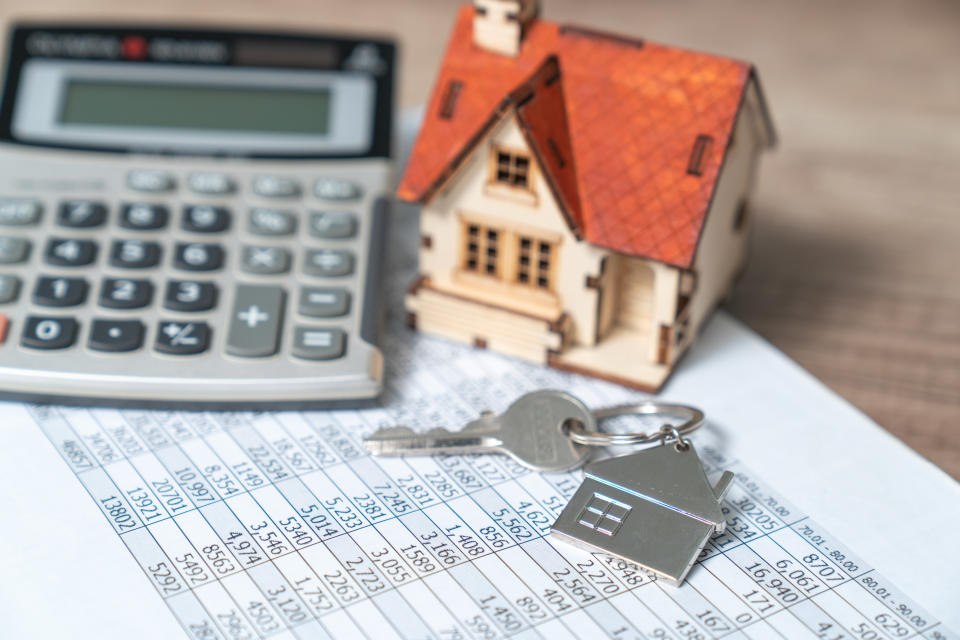
"Avoid debt that won’t pay for itself, folks. Basically, student loans in a wisely chosen field are okay, but random credit cards are not. Pay cash, borrow, barter some eggs, whatever you have to do — do not finance 'stuff.'
"And for the love of god, stop going to restaurants. It is shocking how much that adds up and how bad it is for you. Learn to cook! I’m not saying avocado toast or coffee is ruining your lives, but going out to eat is a tremendous drain. Keep a journal for a month and see where the money goes."
8."I had $160,000 when I started (car, credit card, student loans) and am now down to $116,000. I’m following Dave Ramsey’s 7 Baby Steps and am on track to have this paid off in about three more years. I will never use debt again after this, not even for a mortgage."
—Anonymous
9."I owe about $70,000 on a $200,000 15-year mortgage. I had student loans and car payments. I worked overtime when possible, saved money whenever I could, did without extras and things that weren’t necessary. I paid off the student loans and cars as soon as I could. I never use credit cards. I live below my means. It was hard work for about 10 years, but now, being nearly debt-free is very freeing. "
—Miguel, 42
10."I am in my early 40s, have a master's degree in education, and am a single coparenting mom of two kids under 14. I have close to $200,000 in debt. It's a combination of student loans, credit card debt, a car loan, and a personal loan to pay off credit cards. TBH, I fall into ignoring the vast amount and just saying 'F it' and ordering food delivery. Other times, I have to handle unexpected expenses, like car repairs, dental bills, or kid sports–related costs. Seeing it in print now is really making my financial anxiety spike, LOL, but it's crucial that these financial discussions are taking place."
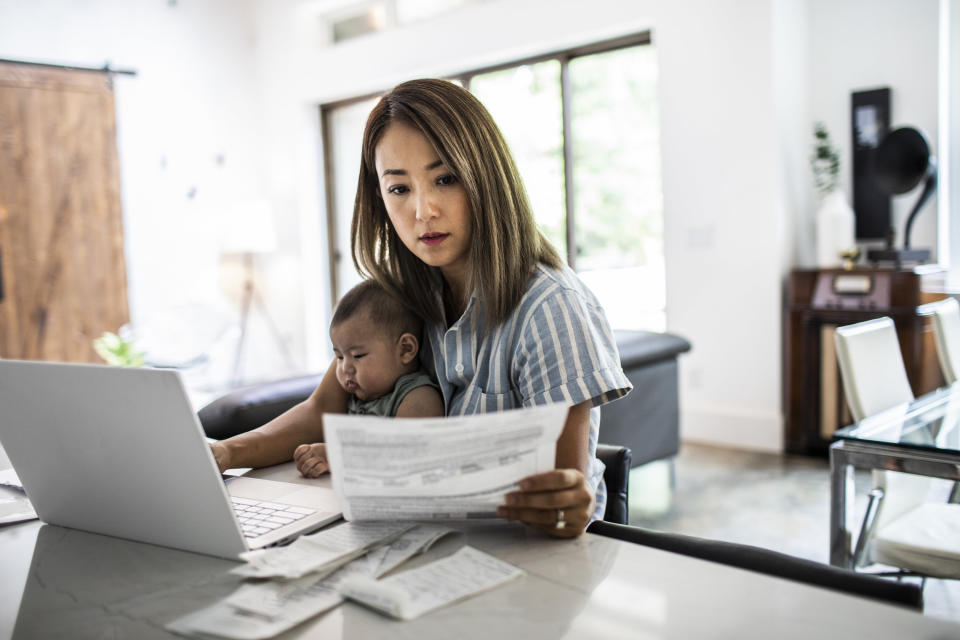
"It's not fun to look at debt, but making plans to combat it requires some moments of discomfort, knowing this burden is always looming. I've taken steps to obtain higher-paying jobs and work additional jobs during school breaks, so I feel hope. I'm aiming to make better financial choices and change my spending habits, though I don't see myself debt-free in the immediate future. I'll just do what I can."
—Smiley, 41
11."I have about $25,000 in mostly credit card debt. I was on top of it until a three-week stay in the hospital with no vacation time or short-term disability. The loss of nearly a month in income is something that I just started to recover from, and then my money was garnished by the state for taxes owed from six years ago. The $200 that I owed and completely forgot about became $3,000. I make over $50,000 a year and will hopefully be back on track next month."
—Jeremy, 51
12."Just my house, which is now under $100,000. I pay my total credit card balance every month and live within my means. Shout out to my dad for drilling this into my thick skull!!!"
13."All I have is student loan debt, about $20,000, and my partner has quite a bit more from a master's degree. Our strategy? Pay as little as possible toward it while on an income-driven repayment plan. We both have some public service work under our belts and will likely add to that total. Even if federal loan forgiveness doesn't go through now, I'm confident we won't be saddled with it forever. Debt is morally neutral. I'm not worried or guilting myself about it. Probably paid less than 10% off in over a decade because we don't make much. The only way it would really affect us is if we bought a house, which is a big LMAO at this point."

—Anonymous
14."My husband and I were both fortunate enough to be able to complete college without student loans due to a combination of working full time and grants for me and the GI Bill for him. We run the majority of our household expenses through our joint credit card for the rewards points and pay it off monthly. We paid off his car before we bought our house to lower our debt-to-income ratio and bought my car outright from an insurance payout, so right now our only debt is our mortgage, which is currently around $136,000. We borrowed about half of what we qualified for to keep the payment low, and we typically put a couple of extra payments toward just the principal each year, so we are currently on track to pay it off a few years early."
—Anonymous, 29
15."I have absolutely no idea how much debt I'm actually in; I dread to think. I'm dealing with it by ignoring it until I'm threatened with bailiffs...I can't actually pay it, so no point in worrying until there's a risk."
16."I have a total of around $20,000 and counting in debt. This is a combination of unpaid medical bills, tuition, credit card debt, and personal loans. I really don't know where to start. I am only 21 and I am drowning. I have a hard time sleeping, and I already have no money left at the end of the month. Sometimes I think it would be easier to just wait the seven years for it to drop off my credit report."
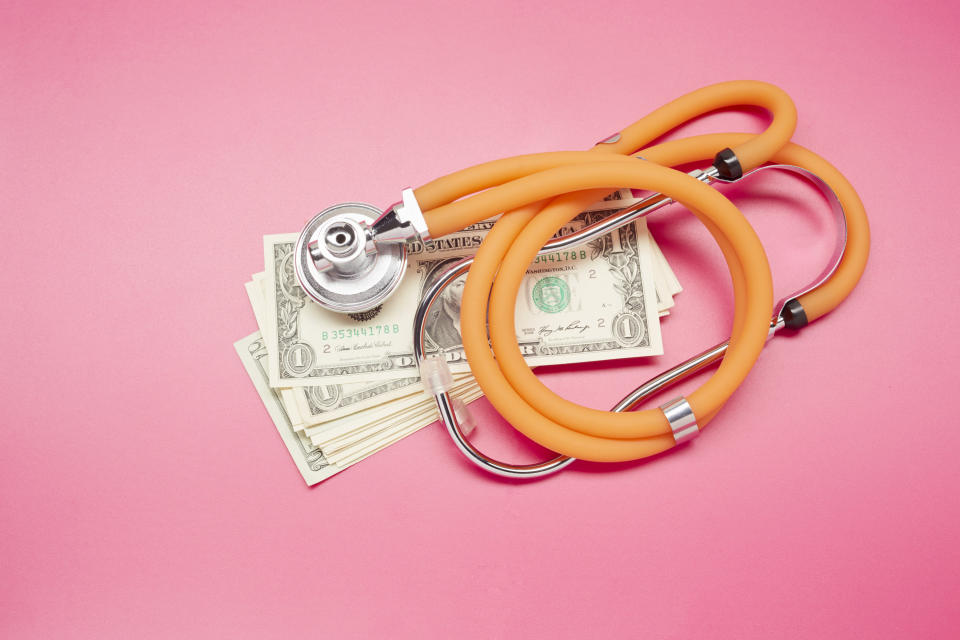
—Sav, 21
17."It’s student loan debt of over $30,000, and the indexation rate (on Australian student loans) this year means that I’ll be charged over $2,000 for nothing, despite these loans supposedly not being charged 'interest.' It’s such a scam. 'Indexation' shouldn’t be allowed, and it takes advantage of the naivete of a lot of young people, including me. I believe that university debt shouldn’t grow and you should only owe what you agreed to study for and nothing more."
"I wish I’d thought about this more seriously before enrolling, but like many others, my choice was to sign up and be forced to accept the debt in the pursuit of a career or miss out on the education that should lead to a career. Students accept it, and we realize later in life how hard it is to pay back and how it actually does impact our mental health having to watch it grow faster than we can pay it back. Society should really reconsider this debt-trap cycle many of us are stuck in."
—Anonymous
18."I only have a mortgage and minor credit card debt (I owe $600 between two credit cards). I’m just really good at not spending money I don’t have. I will sell some things or, because I have the luxury of being self-employed, I’ll pick up some extra work if I know I have an unusually large expense coming up or need to recover from a little mishap. Instead of going to university full time and working part time, I avoided student loans by picking and choosing courses to take part time based on what I actually found beneficial to whatever full-time job I was looking to advance in at the time. My first job included lodging, so I didn’t have to pay rent for my first few months on my own while I established an adult life. (Lots of those kinds of jobs are available if you’re willing to travel for them, even just temporarily.)"
"I got my first credit card at 19 and kept it at a $1,000 limit, right up until I turned 25 and raised it to $2,000. I use it all the time, and I have raised it again since then, knowing I have some big purchases coming up, but my limit is always far less than what I make in a month, so even if I can’t pay it off entirely that month, I also don’t end up drowning in it even when it’s maxed out.
"My fiancé and I have similar financial mindsets but also keep our finances completely separate other than when it comes to the house itself: One of us pays the mortgage and the other pays the rest of the bills associated with it, since they add up to about the same amount every month, give or take $100.
"I didn’t have anyone step forward to put me through a postsecondary education — no vehicles bought for me. I did win myself a $5,000 prize in a small business competition to help my business start up, and my fiancé is very handy, so we were able to DIY most of my space, but otherwise, I’ve just lived within my means and accepted that staying out of debt is just as impressive and important as building wealth — especially when you can pull it off making less than $50,000 a year.
"Invest in advancing your experience and things that last where you can and when the opportunity presents itself, even if it doesn’t seem relevant at that time. Always move forward, but find a way to ensure a small safety net."
—Charlotte, 28
19."Not including our mortgage, my wife and I probably have about $12,000 in credit card debt. We just bought our house in November, and because of high interest rates, we are playing catch-up for sure. I decided last month to go ahead and get a second job part time as a server. Tips are actually helping a lot alongside our two full-time-job incomes. Unfortunately, I am having to sacrifice time with my family, but in the end, I know it'll be worth it to be financially stable."
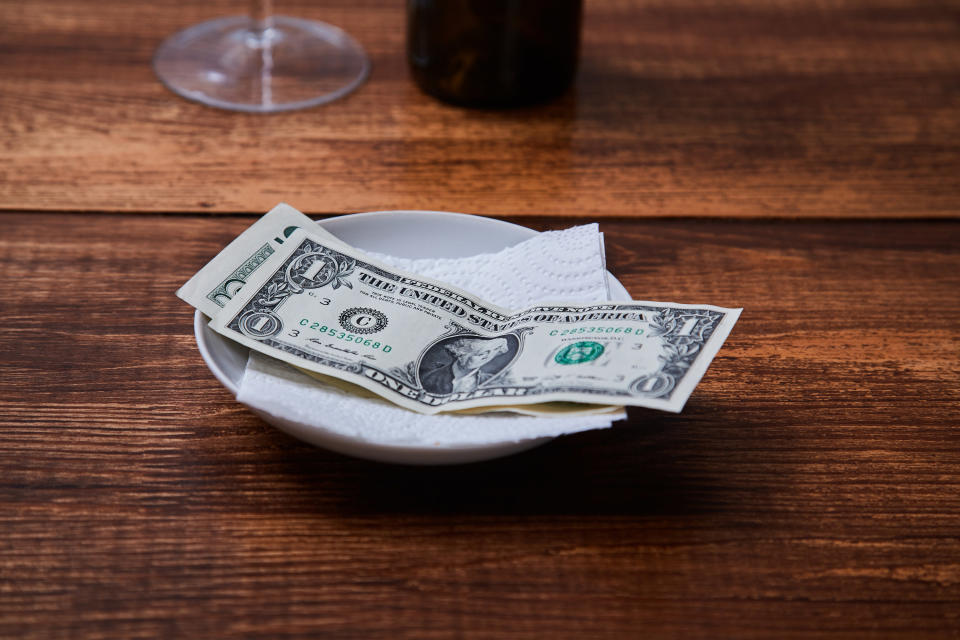
20."We still have about $50,000 in student debt from medical school. We started off with $280,000 in federal student loans. Originally, we were paying $1,500 per month, and it seemed as if the payments were doing nothing but making the amount we owed go higher! We consolidated and refinanced with a private company. I don’t know if it’s because I’ve become more financially literate or what, but I could not understand the federal loan statements we were receiving; now I know exactly how much interest and principal we are paying for our private refinancing. It’s like having a second mortgage, but after six years, we are one and a half years away from being debt-free. We cannot wait!"
—Anonymous
21."Honestly, I have no idea how much debt I have these days. I took out $120,000 for grad school, I pay every month, and the amount of debt just keeps going up. So I try not to think about it. I'll never pay it off anyway. And I can never buy a house even with my great credit score because my debt-to-income ratio is abysmal."
—George, 43
22."Since getting married last July, I’ve accumulated $10,000 in credit card debt — more debt than I’ve ever had in my life. I liquidated my small 401(k) to pay for the wedding, but since then I've been working less regularly and more gigs. My new husband brings a lot of debt to the table too — over $90,000 before he started to chop it down. So while he works on that, I’ve taken the majority of the day-to-day household bills on my credit. He kicks me back some money when he has extra, but it’s not a reliable source of cash flow, and with the price of groceries now versus what I budgeted last year, I’m looking at opening a new card just to float us. My husband makes too much for us to get government assistance, but not enough to help the family besides paying back his own business loans and bills."

23.And finally, "I always lived below my means and didn't buy on credit. No debt! Feels great!"
—Steve, 70
Can you relate to any of these stories? Tell us about your debt and share what's worked for you in managing it in the comments below!
Note: Some responses have been edited for length and/or clarity.

